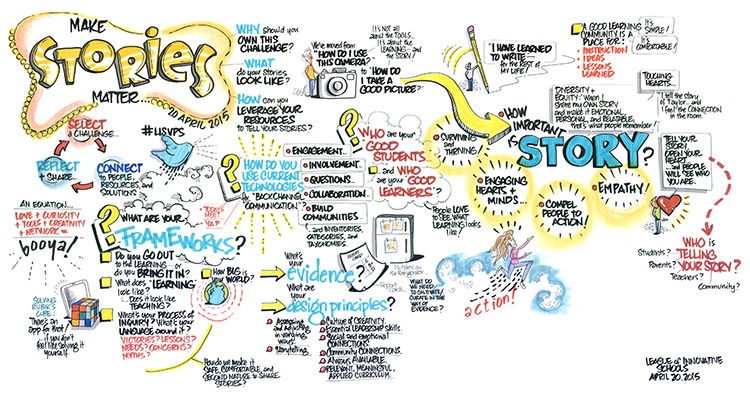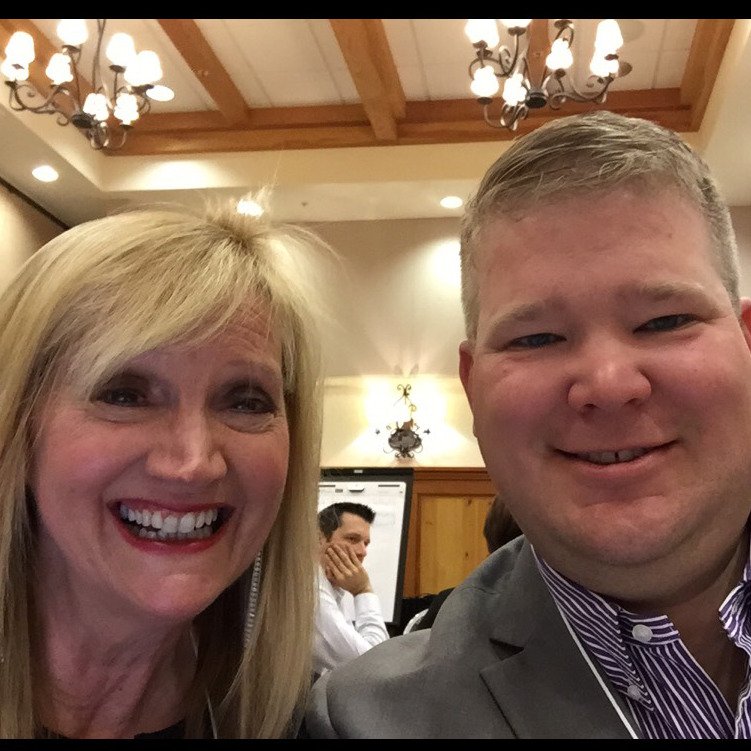
Every school has a story. And it’s these stories that help us go beyond the data, policies, and procedures to better understand the state of teaching and learning. Stories help us focus on the people in education and help innovative ideas spread.
Storytelling was the theme of the League of Innovative Schools spring 2015 meeting, April 19-21 in Vancouver, Wash. Co-hosted by Vancouver Public Schools, the meeting brought together school leaders, researchers, and entrepreneurs for collaborative workshops, knowledge sharing, and school visits.
Our League meetings offer a valuable look at the victories, lessons, and challenges of school districts around the country. Here’s what we learned.
It’s important to spotlight victories in education. Too often we dwell on the mistakes. Victories inspire others to take action and develop solutions. Here are some of the victories we saw from League members.
In schools around the country, there are amazing stories that go untold. To uncover those stories, we asked districts to be their own storytellers by submitting videos to the League of Innovative Schools Film Festival.
We received nearly 50 submissions in three categories:
Check out all of the submissions here and the winners below.
Empowering, Excelling, Elevating – Winner: Blue Valley School District
The winners and their trophies!
.@DigitalPromise @VancouverSD #LISVPS film festival winners. pic.twitter.com/YfqUzrouTf
— Dr. Steve Webb (@SuptVPS) April 20, 2015
We believe schools can create better outcomes for students if they look outside of their own communities and learn from others. Our League meetings are intended to spark these connections. For example…
Leaders from Napa County, Calif., helped Utica Community Schools, Mich., design its early elementary blended learning program.
#LISVPS Practicing photo techniques with @barbnemko and @ucsjohns @DigitalPromise meeting in US Vancouver pic.twitter.com/DXbLAAeJMM
— Peg Maddocks (@PegMaddocks) April 20, 2015
Aileen Owens, from South Fayette School District, and Todd Keruskin, fromElizabeth Forward School District, are part of an “innovation cluster” in the Pittsburgh area, where schools, businesses, and other organizations partner to improve outcomes for students.

The League brings together superintendents, but we know they don’t develop the vision for their districts alone. That’s why we convene a group of district leaders affectionately called “Everybody But Superintendents.” This group of chief technology officers, curriculum directors, instructional technology chiefs, principals, librarians, and those wearing many other hats are able to connect through their unique roles in their districts.
Putting it all together with other district leaders #EBS #LISVPS pic.twitter.com/WopmP6wksM
— DeWayne Cossey (@techleadr) April 21, 2015
While it’s important for educators to tell their stories, it’s equally important for them to listen to others. One common trait among leaders from the League of Innovative Schools is a curiosity and a passion for learning new things.
League meetings are a great place to hear about interesting, creative, and effective practices from leading school districts.
We learned that…
… An 11th grader at Utica Community Schools, Mich., started her own computer programming club for girls during spring break, recruiting employees at Google and the University of Michigan to teach classes virtually.
… An elementary school in Indian Prairie School District, Ill., offered technology training for parents and saw an increase in families taking advantage of low-cost Internet programs in the community, helping to bridge the gap between home and school.
… A 7th grade student at Kettle Moraine School District, Wis., wanted to help other students understand the academic options available to them. He approached Superintendent Pat Deklotz and is now working with administrators on a plan to inform students so they have voice and choice in their learning environments.
… Baltimore County Public Schools is partnering with Johns Hopkins University to create a framework that goes beyond test scores to evaluate whether its technology and innovation programs produce the right outcomes for students.
Another key lesson learned came from our Director of Story Marco Torres. Marco is a storyteller and former teacher who helps educators and students share their perspectives and experiences. Marco led a workshop to help League members support expression among stakeholders in their districts. Additionally, Betsy Henning of branding agency AHA! discussed the importance of sharing stories from the private sector.
@marco21 Stories open the heart. If we want to connect our public with public education we need to open the hearts of our public. #LISVPS
— Pat Deklotz (@PDeklotz) April 20, 2015
.@DigitalPromise @VancouverSD Quit making instead find the story! #LISVPS pic.twitter.com/O1MQkMaBq2
— Dr. Steve Webb (@SuptVPS) April 20, 2015
Principles of digital story telling. #LISVPS pic.twitter.com/6d6h3obpir
— Damian LaCroix (@DLHSSD1) April 20, 2015
Our League meeting co-host, Vancouver Public Schools, is a national leader in district-wide digital transformation. After the community passed a $24 million technology levy in 2013, the district began its weLearn 1:1 initiative to personalize learning for all students through technology.
With mottos of “go slow to go fast” and “believe in big ideas,” the district is:
Engaging students through STEM
Ms. Hansen at Skyview high school was out sick for a few weeks, so robotics students printed her 3d flowers. #LISVPS pic.twitter.com/ITokkynIw7
— Melissa Gedney (@melissaged) April 20, 2015
Giving students ownership of their own learning
Students verbally, face-to-face, discuss how technology & #BlendedLearning affects their lives and learning. #LISVPS pic.twitter.com/7PoVIas8fe
— Michael Hornback II (@hornbackmd) April 20, 2015
Supporting students in pursuing their own interests
Wow! This student's senior project will be making music through martial arts – using an air piano #LISVPS pic.twitter.com/7xqWF75dmr
— Chelsea Waite (@chelseawaite) April 20, 2015
League attendees had the opportunity to visit seven schools. Read more about the sites or watch VPS videos!
To learn more about Vancouver Public School’s strategic vision, view Superintendent Steve Webb’s slideshow, a digital learning snapshot, and the implementation timeline of their 1:1 rollout.
By bringing leaders from school districts around the country together, we get an important glimpse into the shared challenges they are facing. Here are some of the pressing questions we heard:
Many schools want their students to be globally competitive and to understand concepts on an international scale. But a big challenge is that the definition of “global competence” varies from district to district. West Ada School District, Idaho, may be focused on assimilating refugee students into a new and unique environment. Low-income and rural Owsley County Schools, Ky., may simply want to help students conceptualize the world outside of their community.
In a workshop led by the Asia Society, districts discussed what global competence means in the context of their districts and prepared pitches to stakeholders on the importance and relevance of global competency.
Resources:
With many districts in the midst of statewide testing, a much-discussed challenge was the tension between innovation and accountability. Many superintendents felt that standardized testing does not do enough to evaluate the skills they are trying to instill in students.
Instead, districts said that student portfolios and the breadth of learning insights provided by technology can create a clearer picture of students’ strengths, weaknesses, and mindsets. League members Mineola, N.Y., and Kettle Moraine, Wisc., both offer student portfolios that track work and progress throughout their education.
Resources:
Over the past year, League members have participated in working group calls, in-person meetings, and a study tour to see competency-based models in New Hampshire. At the spring League meeting, working group members participated in a design thinking workshop where they developed plans for their districts and committed to reporting on the progress, victories, and challenges.
Resources:
Educators earn credentials at the beginning of their careers, but they learn new skills every day. Because educators are recognized for the time they spend in formal professional development settings, it’s challenging for League districts to provide the opportunity to demonstrate the full breadth of what they have learned.
To address this, Digital Promise is building a system of micro-credentials that offers educators a new way to gain recognition for the skills they learn throughout their careers, regardless of where that learning occurs.
Resources:
Special thanks to our corporate partners and our meeting sponsors. For great information and opportunities to get involved with our sponsors, please see our resources page.
